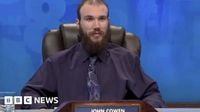On a seemingly ordinary Saturday morning in Blackpool, the usually quiet function room of the Wainwright Social Club was transformed into the scene of a shocking incident that has since gripped the community of Countdown fans and beyond. On September 14, 2024, just after 11:30am, a gathering of around 30 enthusiasts—former contestants and dedicated followers of the Channel 4 quiz show—found themselves witnesses to violence that no one could have anticipated at a fan tournament.
The event, organized by the Focal Countdown Group, was meant to be a friendly, unofficial competition, where aficionados could test their word and number skills against each other. Instead, it became the backdrop for an attack that left one man hospitalized and another in psychiatric care, with the future of both men—and the fan community—left in turmoil.
According to the BBC, John Cowen, a 31-year-old Cambridge mathematics graduate and former Countdown champion, entered the club’s function room holding a knife in his left hand. CCTV footage, later shown to a jury at Preston Crown Court, captured the chilling moment: the knife glinted as Cowen walked past the camera, his eyes apparently locking onto Thomas Carey, a rival and fellow fan club member since 2011. Without hesitation, Cowen broke into a run, lunged across a table, and stabbed Carey in the left bicep.
Prosecutor Rosalind Scott Bell described the sequence in vivid detail to the jury: “The defendant had a knife in his left hand. You can just about make it out, glinting as he walks past the camera. He appears to see Mr Carey and he then breaks into a run and he goes straight for him. The defendant lunged across the table with his left hand going straight towards Mr Carey. Mr Carey was forced back on to the seat behind him and you can just about make out him trying to kick towards the defendant. Mr Carey then grabbed the defendant's wrist in an endeavour to stop the assault. By then he had been stabbed.” (Sky News)
Carey, himself a former Countdown champion, later recounted the terrifying moments leading up to the attack. As reported by The Independent, he said he heard a “half-growl, half-scream” before seeing Cowen pushing past people and tables to reach him. “He came up to me with the knife and he then stabbed me in the arm. Immediately I grabbed on to his arm and called for help,” Carey testified. The noise and commotion quickly drew the attention of others in the room, who rushed to restrain Cowen on the ground until police arrived.
Paramedics were called, and Carey was transported to hospital where he was treated for the stab wound to his left bicep. Meanwhile, police officers searching Cowen discovered another kitchen knife in his pocket, adding a further layer of concern to an already disturbing incident. Cowen was arrested at the scene, and soon after, the full scope of his mental health struggles began to emerge.
The fan club itself, the Focal Countdown Group, is well-known among followers of the show for its regular tournaments, where both former contestants and fans meet across the country to challenge each other and keep the spirit of Countdown alive. Carey had been attending these conventions since 2011, and he knew Cowen from previous events. The community, while competitive, had always prided itself on camaraderie and mutual respect—making the violence all the more shocking.
As the legal process unfolded, more details came to light regarding Cowen’s state of mind. According to BBC and The Telegraph, Cowen was declared “seriously mentally unwell” and ruled unfit to stand trial by Judge Guy Mathieson on September 10, 2025. Instead of a traditional criminal trial, the court convened a fact-finding hearing, with the jury tasked only to determine if Cowen had committed the acts as alleged. The jury ultimately found that he had indeed committed assault and had been in possession of a bladed article in a public place.
The motive behind the attack remains complex and, perhaps, rooted in the unique pressures and dynamics of the Countdown fan community. During the hearing, it was revealed that some attendees practiced for the tournaments using a mobile app, which allowed them to hone their skills online. Jonathan Lally, Cowen’s defense counsel, pressed Carey about this, asking, “Can you ever recall that he thought people were using the app and he felt cheated?” Carey replied, “Yes, he said something like that at some point.” (The Independent) This sense of perceived unfairness—however unfounded—may have contributed to Cowen’s deteriorating mental state.
Cowen’s achievements on Countdown were significant. In 2017, he appeared on the show, scoring the third-highest total of that series and winning eight consecutive contests before finally being defeated. His performance included spotting the nine-letter word “SPREADING,” a testament to his skill and intellect. Yet, as the events of September 2024 revealed, personal struggles and mental health challenges can overshadow even the brightest moments of public success.
Following his arrest, Cowen was transferred to a secure mental health hospital, where he remains under treatment. Sentencing, originally scheduled for September 30, 2025, was adjourned pending further psychiatric reports. The court charged him with one count of wounding and two counts of possession of a bladed article in a public place.
The incident has prompted soul-searching within the Countdown community and raised broader questions about mental health support, even in circles not typically associated with such risks. While fan clubs and competitive gatherings are often seen as safe spaces for shared passion, the attack in Blackpool serves as a stark reminder that underlying issues can surface in unexpected and tragic ways.
For many, the story of John Cowen and Thomas Carey is not just about a shocking act of violence, but also about the importance of vigilance and compassion. As the legal system continues to grapple with the intersection of mental health and criminal responsibility, the Countdown community—and the wider public—are left to reflect on how quickly a shared hobby can turn into something unrecognizable.
With Cowen’s fate now largely in the hands of medical professionals and the court awaiting further reports, the fan community is left to rebuild its sense of safety and trust. The events at the Wainwright Social Club will not be easily forgotten, but they may serve as a catalyst for greater awareness and support for those struggling behind the scenes, even in the most unlikely of places.


